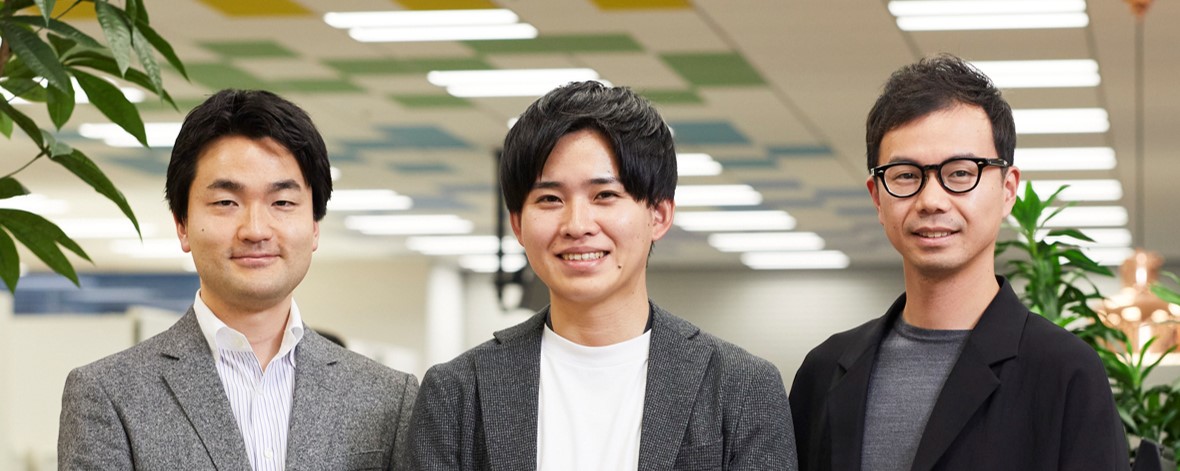Amidst the global push towards a decarbonized society, not only a few listed companies in Japan but also many small and medium-sized enterprises are making progress. In this context, SMBC Group has developed “Sustana,” a service to support companies in reducing their CO2 emissions. We spoke with the team involved in the development of “Sustana” about the background of its creation and future prospects.

Cloud services
“Sustana” and “Sustana Agri”
that support the decarbonization of companies and agricultural producers
- Rin Shimizu, SMBC (left)
- Shunsuke Akiyama, SMBC (center)
- Shoichiro Imaizumi, The Japan Research Institute, Inc. (right)
Aiming for the promotion of decarbonization, we developed Sustana : Moving further towards services specialized in agriculture
- Shimizu:
- As SMBC Group aspired to be a catalyst in accelerating the transition to a decarbonized society, we started planning and developing Sustana in April 2020. At that time, many companies wanted to manage their carbon footprint but didn’t know how to calculate their CO2 emissions, and there were few experts in this field, creating a situation where supply couldn’t meet demand. Therefore, we thought that by developing a cloud service that is both easy to use and affordable, we could address the challenges faced by many companies. In other words, the idea was to generalize the domain of decarbonization experts.
- Akiyama:
- I am the project owner of Sustana-Agri, a cloud service specialized in agricultural products. Feeling the growing need for visibility of CO2 emissions across the entire food supply chain, and based on my experience working with the agricultural corporation “Mirai Kyoso Farm Akita,” where I was involved in promoting smart agriculture using digital technology, I am planning and developing this service. I believe that by utilizing Sustana, agricultural producers and food-related companies can collaborate to visualize and reduce CO2 emissions.
- Imaizumi:
- I am involved in creating the specific mechanisms to implement Sustana-Agri as a product service. Nowadays, companies are required to visualize their CO2 emissions across the entire supply chain, including up to Scope 3 emissions. However, especially for Scope 3 emissions, there are challenges with the current calculation method (activity volume × emission factor from a general database), such as not being able to reduce emissions without reducing activity volume. Therefore, we are first aiming to calculate emissions in the agricultural sector based on the actual work practices of agricultural producers, and provide its data to food-related companies to achieve a visualization of CO2 emissions that reflects reality.

What is Sustana?
Sustana is a cloud service provided by SMBC Group to support the calculation and reduction of CO2 emissions. It allows companies to manage the entire process from calculating CO2 emissions across their enterprise and supply chain to planning and implementing reduction measures, all on the cloud.
We aspire to create a world where companies and agricultural producers dedicated to reducing environmental impact are recognized and valued.
- Shimizu:
- By adding decarbonization as a third axis of evaluation to the current standards of price and quality, agricultural producers and businesses can develop new strategies for differentiation. Indeed, at the time of its release, Sustana was primarily adopted by big companies, but now we're seeing an increase in its uptake among medium-sized and small enterprises, indicating a broadening base. Both agricultural producers and SMEs can enhance their competitiveness through decarbonization efforts, and we aim to build a society where their commitment to reducing environmental impact is duly rewarded. The visualization of CO2 emissions is crucial in this regard.
- Akiyama:
- Although still in the pilot phase, Sustana-Agri considers the integration with farming support apps crucial for collecting data without burdening agricultural producers. It's also important to develop with an eye on needs two to three years down the line. While business viability still requires consideration, visualizing and rewarding the efforts of agricultural producers towards reducing environmental impact is one of the goals of this project.
- Shimizu:
- Even in the traditional industry of Japanese sake, companies are gaining international attention and expanding their markets with carbon-neutral brewing practices. In this way, decarbonization is a driver for “Japan's Regrowth,” one of SMBC Group’s key initiatives. We aim to continue creating social value in partnership with companies and agricultural producers, centered around Sustana, to contribute to the overall growth of Japan.
Profile
Rin Shimizu
- Head of the Strategic Planning Group, Sustainable Solutions Dept.
- Sumitomo Mitsui Financial Group, and SMBC
After working in the corporate sales department, he was transferred to a department that develops new businesses. In 2020, together with the Japan Research Institute, he supported the establishment of an SDGs financial system for regional revitalization in Yokohama City. Currently, he is involved in the planning, development, and promotion of Sustana and other sustainable solutions in general.
Shunsuke Akiyama
- Vice President, Business Development Group, Sustainability Development Dept.
- Sumitomo Mitsui Financial Group, and SMBC
After working in corporate sales and planning work such as private banking business in Nagano Japan, he was seconded to Mirai Kyoso Farm Akita Co., Ltd. in 2022. Currently, he is involved in the company's business operations from the bank, as well as business development in the food and agribusiness field and decarbonization-related business initiatives.
Shoichiro Imaizumi
- Specialist, Center for the Strategy of Emergence
- The Japan Research Institute, Limited.
He is engaged in the business development of next-generation agricultural robots, and other service designs that utilize digital and robot technology, mainly in the agricultural field. Currently, he plans, develops, and promotes solutions that promote carbon neutrality and nature positivity.